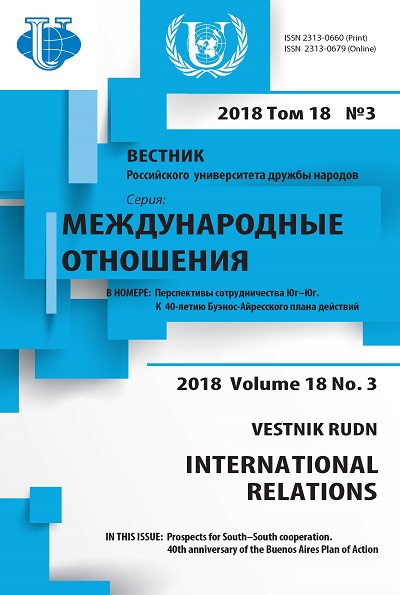IRAN’S FOREIGN POLICY AND EVOLVING ROLE OF SOUTH-SOUTH COOPERATION
- Authors: Zaccara L.1
-
Affiliations:
- Qatar University
- Issue: Vol 18, No 3 (2018): Prospects for South—South Cooperation. 40th Anniversary of the Buenos Aires Plan of Action
- Pages: 550-564
- Section: THEMATIC DOSSIER
- URL: https://journals.rudn.ru/international-relations/article/view/20103
- DOI: https://doi.org/10.22363/2313-0660-2018-18-3-550-564
- ID: 20103
Cite item
Full Text
Abstract
The Islamic Republic of Iran is one of the most active players in the framework of South- South cooperation. During the Cold War period Iran treated South-South cooperation as an instrument for providing an independent foreign policy and defending the rights of “oppressed” peoples from the influence of colonizers and imperialists. Nowadays this vector of cooperation is used by Iran as tool for gaining regional superiority in the Middle East and the Muslim world in general. This article describes the Iranian foreign policy strategy and determinants from the Shah Pahlavi period until Hassan Rouhani presidency in order to assess whether the tools used to foster South-South cooperation for becoming regional power and achieving international recognition by the international community were useful. The author uses qualitative methodology in order to answer the following research questions: to analyze the Iran’s foreign policy literature, to identify the SSC initiatives in the post-bipolar era during the presidency of Hashemi Rafsanjani, Khatami, Ahmadinejad and Rouhani, to explain the essence of “non-aligned strategy” and third-worldism. The article also covers the participation of Iran in the international institutions of the Global South, including Non-Aligned Movement (NAM), Organization of Islamic Cooperation (OIC), G77, etc.
About the authors
Luciano Zaccara
Qatar University
Author for correspondence.
Email: luciano.zaccara@qu.edu.qa
PhD in Arab and Islamic Studies, Assistant Professor, Research Coordinator in Gulf Politics, Qatar University
References
- Afrasiabi, K. (1994). After Khomeini. New Directions in Iran’s Foreign Policy. Boulder, CO: Westview Press
- Acharya, A. (2016). Studying the Bandung conference from a Global IR perspective. Australian Journal of International Affairs, 70 (4), 342-357. DOI: https://doi.org/10.1080/ 10357718.2016.1168359
- Arghavani Pirsalami, F. (2013). Third Wordism and Ahmadinejad's Foreign Policy. Iranian Review of Foreign Affairs, 4 (2), 81-109
- Barzegar, K. (2010). Regionalism in Iran’s Foreign Policy. Discourse: An Iranian Quarterly, 9 (3-4), 37-56
- Dehshiri, M.R. & Majidi, M.R. (2008). Iran’s Foreign Policy in Post-Revolution Era: A Holistic Approach. The Iranian Journal of International Affairs, XXI (1-2), 101-114
- Diansaei, B. (2018). Iran and Saudi Arabia in the Middle East: leadership and sectarianism (2011- 2017). Vestnik RUDN. International Relations, 18 (1), 124-134. https://doi.org/10.22363/2313 0660-2018-18-1-124-134
- Esposito, J.L. & Piscatori, J. (Eds.). (1990). The Iranian Revolution: Its Global Impact. Miami, FL: Florida International University Press
- Halliday, F. (1979). Iran: Dictatorship and Development. New York: Penguin
- Haji-Yousefi, A.M. (2010). Iran’s Foreign Policy during Ahmadinejad: From Confrontation to Accommodation. Paper presented to the Annual Conference of the Canadian Political Science Association June 2-3, 2010, Concordia University, Montreal, Canada
- Haji-Yousefi, A.M. (2012). Iran and the 2011 Arab Revolutions: Perceptions and Actions. Discourse: An Iranian Quarterly, 10 (1-2), 23-60
- Khamenei, the Hassan and Hossein Doctrines, and ‘Heroic Flexibility’ versus ‘Heroic Resistance’ in Nuclear Negotiations. (2013). IranPolitik, The Iran Political Analysis Project. URL: http://www.iranpolitik.com/2013/09/20/analysis/khamenei-hassan-hossein-doctrines-heroicflexibility-heroic-resistance/ (accessed 10.11. 2015)
- Ramazani, R.K. (1990). Iran's Export of the Revolution: Politics, Ends and Means. In: The Iranian Revolution: Its Global Impact. Ed. by John Esposito, Miami: Florida International University Press, p. 41-57
- Ramazani, R.K. (2004). Ideology and Pragmatism in Iran’s Foreign Policy. The Middle East Journal, 58 (4), 1-11
- Rodriguez Zahar, L. (1991). La Revolución Islámica-clerical de Irán, 1978-1989. Mexico City: El Colegio de México
- Zaccara, L. (2016a). Iran’s permanent quest for regional power status. In: Diplomatic Strategies of Leading Nations in the Global South: Asia, Africa, Latin America, and the Middle East. Ed. by Braveboy-Wagner J. New York: Palgrave Macmillan, p. 181-211
- Zaccara, L. (2016b). From Dialogue of Civilizations to Alliance of Civilizations: Iranian and Spanish initiatives revisited. International Studies Journal, 12 (3), 63-75
Supplementary files










